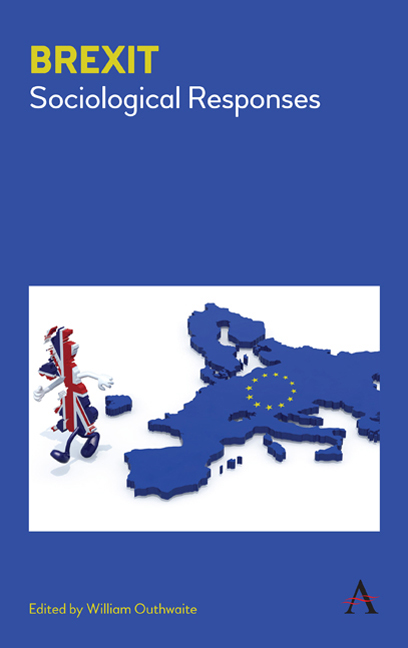Book contents
- Frontmatter
- Contents
- Preface
- Section 1 HOW DID IT HAPPEN?
- Section 2 THE POLITICS OF BREXIT
- Section 3 PROSPECTS FOR/ AFTER BREXIT
- Chapter Ten The EU and Brexit: Processes, Perspectives and Prospects
- Chapter Eleven The Impossibility of Disentangling Integration
- Chapter Twelve No Exit from Brexit?
- Chapter Thirteen Critical Theory, Brexit and the Vicissitudes of Political Economy in the Twenty- First Century
- Chapter Fourteen European Union versus European Society: Sociologists on ‘Brexit’ and the ‘Failure’ of Europeanization
- Notes on Contributors
- Index
Chapter Twelve - No Exit from Brexit?
from Section 3 - PROSPECTS FOR/ AFTER BREXIT
Published online by Cambridge University Press: 10 January 2018
- Frontmatter
- Contents
- Preface
- Section 1 HOW DID IT HAPPEN?
- Section 2 THE POLITICS OF BREXIT
- Section 3 PROSPECTS FOR/ AFTER BREXIT
- Chapter Ten The EU and Brexit: Processes, Perspectives and Prospects
- Chapter Eleven The Impossibility of Disentangling Integration
- Chapter Twelve No Exit from Brexit?
- Chapter Thirteen Critical Theory, Brexit and the Vicissitudes of Political Economy in the Twenty- First Century
- Chapter Fourteen European Union versus European Society: Sociologists on ‘Brexit’ and the ‘Failure’ of Europeanization
- Notes on Contributors
- Index
Summary
Introduction
The main purpose of this chapter is to examine the concept of Brexit. To this end, the analysis is structured as follows. The first part provides a shorthand definition of the concept of Brexit. The second part reflects on the historical context in which, on 23 June 2016, the UK referendum on European Union (EU) membership took place and which, arguably, had a profound impact on its outcome. The third part sheds light on the various sociological implications of the result of this referendum, paying specific attention to the principal reasons that led to the triumph of the Leave campaign over the Remain campaign. The fourth part offers some critical reflections on the legitimacy – or, as some may argue, illegitimacy – of the referendum's outcome. The fifth part makes some tentative remarks on the prospects of different Brexit scenarios – not only in relation to the UK, but also in relation to the EU in particular and the wider international community in general. Based on the preceding considerations, the chapter concludes by making a case for a ‘critical sociology of Brexit’.
I. What Is Brexit?
In the most general sense, the term ‘Brexit’ refers to the withdrawal of the United Kingdom from the European Union. It remains to be seen whether Brexit constitutes a potential or an actual, an abrupt or a gradual, a reversible or an irreversible process. Irrespective of the question of what the exact nature of Brexit turns out to be, however, there is a wide- reaching consensus – among both its advocates and its opponents – that its consequences are of major historical significance. Of course, one may scrutinize the numerous implications of Brexit on different levels, particularly the following: social, political, economic, cultural, institutional, ideological, scientific, demographic, military, geostrategic and environmental – to mention only the most obvious ones. Notwithstanding the question of what specific role these levels may, or may not, play in the unfolding of a Brexit scenario, it is the confluence of multiple factors that will determine what life in the UK outside the EU, as well as life in the EU without the UK as a member state, will look like.
Information
- Type
- Chapter
- Information
- BrexitSociological Responses, pp. 153 - 182Publisher: Anthem PressPrint publication year: 2017
